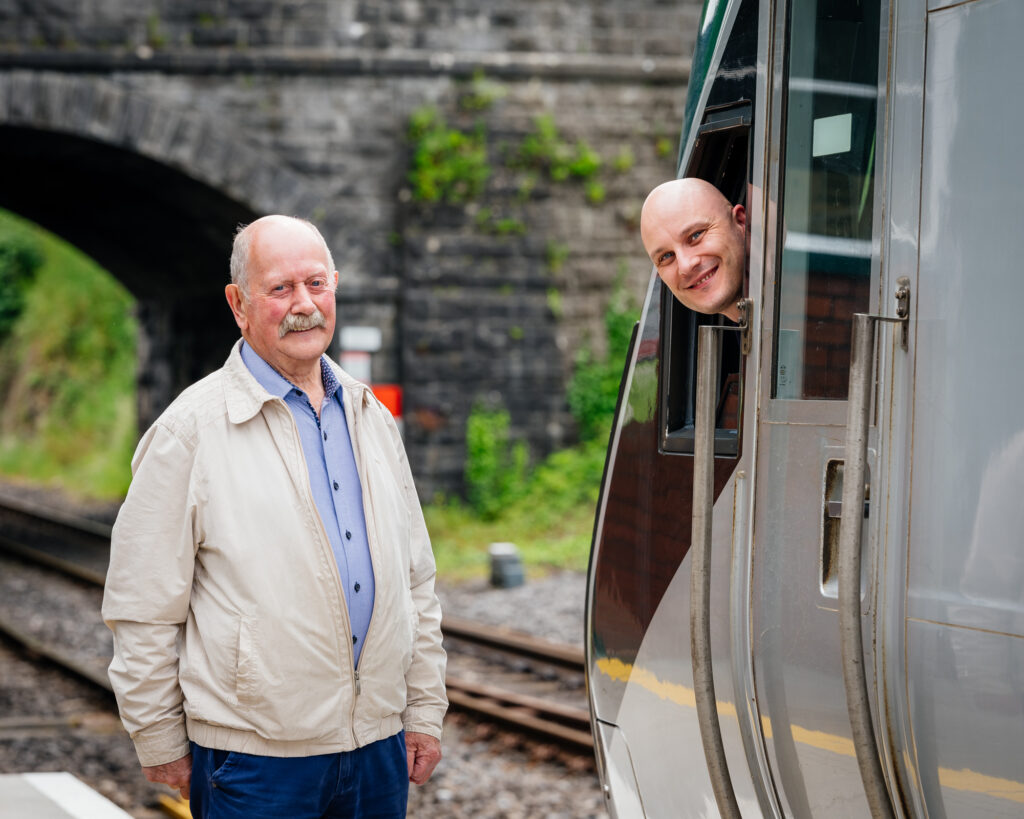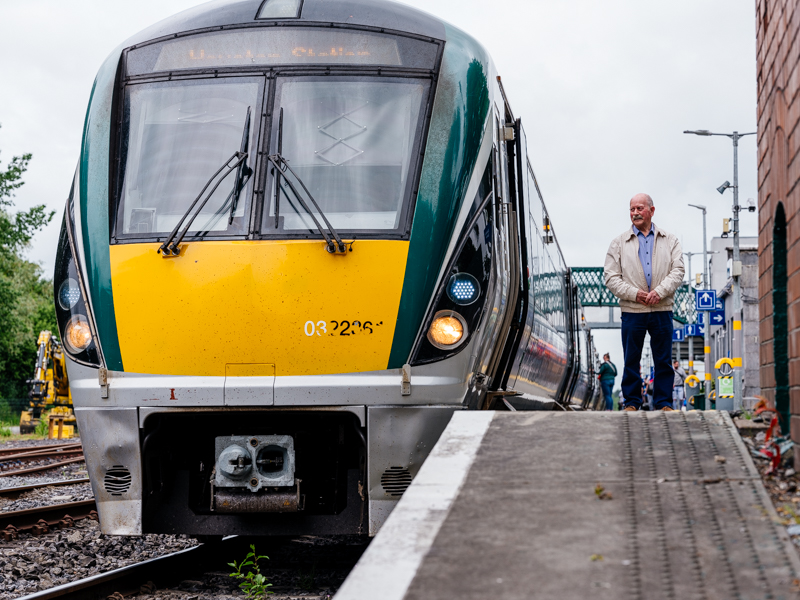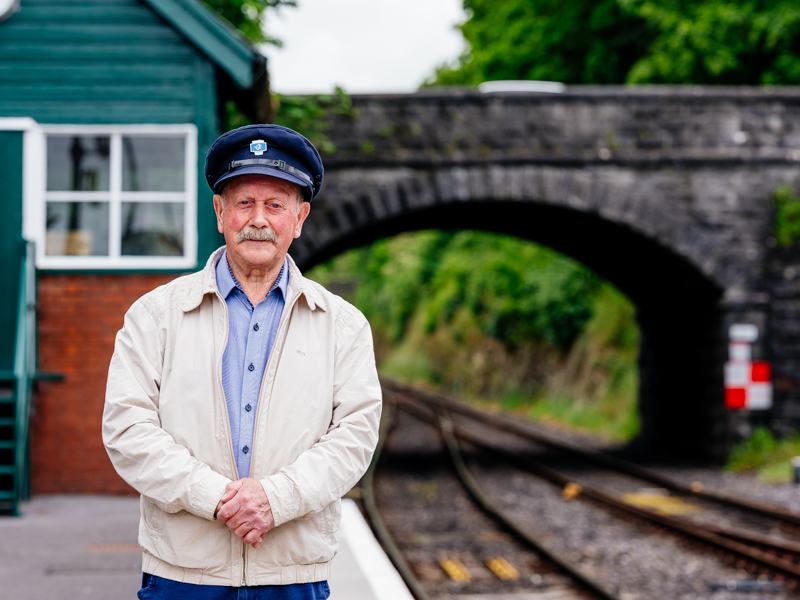“While at St Bridget’s School, I walked four miles along the canal line from my home in Coal Hill to get to town. I never rushed in the mornings, but I always ran back home once classes were over. Those were simpler times but were also tough, particularly in Ireland during the 1940s and 50s. It was challenging to secure. a job without having served an apprenticeship, and many young people had to emigrate.
Growing up, there were three of us children – two sisters, Mary and Rose, and myself. In 1955, five years before my father passed away, his health started declining, and I had to leave school to help on the farm. Back then, farm work was more physically demanding than it is now, and we ploughed with horses and sowed crops like barley, wheat, oats, and potatoes. We were mostly self-sufficient, growing our own vegetables and making butter from cow’s milk using a churn. Cobbe’s mill in Durrow would grind our corn, which we used for porridge and to feed our animals. We sold our barley and wheat to D.E. Williams, where we had an account to get the things we needed throughout the year, and they would take what we owed from the harvest.
Harvest time was always something I looked forward to. If we had any extra money, we might get a new outfit or some new shoes, but whatever we got had to last us the entire year. There were no luxuries back then. We would go to mass in our best clothes, but we would take them off as soon as we got home. There was no way you’d be going around wearing your good clothes otherwise – they had to be minded. When my father needed a new suit, he would go to McCabe’s on Harbour Street, where Percy, the tailor, would take care of him. The house is still there with the McCabe’s sign just about visible, but sadly, it’s derelict now.
In 1957, at the age of 16, I broke my arm while playing football in Cappincur, and it turned out to be a challenging year for me. My arm was put in a plaster cast for a while, making it difficult to complete tasks like saving turf and hay for the harvest. There was always a lot of work to be done.
Two years later, in 1959, I began an apprenticeship in electronics at Gilson’s Electrical shop on Patrick Street in Tullamore. Our work involved repairing electric kettles, irons, and radios and installing televisions throughout the county. To receive reception from the BBC, we had to install a high aerial on the chimney since no Irish channels were available until December 1961. Hard to believe that my wages were £1.10 shillings per week. Unfortunately, I had to leave Gilson’s in September 1960 when my father became very ill, and I was needed on the farm. It was a tough time for our family, and he passed away in November of that year at the young age of 67.
I have always kept myself busy with work and other activities throughout my life. In 1958, I joined the Order of Malta and began providing voluntary first aid at various sporting events, including GAA, soccer, rugby, and cross-country events for Tullamore Harriers. I also volunteered at the County Home and Tullamore Hospital. Despite the constant workload, making ends meet on our 27-acre farm was challenging, so I decided to get a job to supplement it. Johnny Flanagan had begun constructing houses in Kearney Park, and I worked as a handyman with him for four years. One of the significant jobs we undertook was installing air conditioning units for the new machines being imported from England at the ‘Salts’ factory. As Johnny’s work started to slow down, I was fortunate enough to be offered a job by Joe Sutherland, the factory engineer. I helped the English engineers install the new textile machines, working long 12 to 14-hour shifts and earning a wage of £13 per week.
In 1967, I joined the railway after hearing from Des Walsh, our Order of Malta officer, that the station master was looking for someone to cover holidays. Although I had two other job offers the weekend before I started, I decided to take up the railway job. I met the station master, Joe Craig, on Monday morning and ended up staying for 38 years! I started working in the Goods Store, which was a bustling place as it provided goods to shops across the county. When Dunnes Stores opened in 1968, two extra wagons were added, making the job even busier. My workday started at 6 am but changed to 4 am when two goods trains started to run earlier. I worked six days a week and every other Sunday, and my sleep schedule was all over the place. In 1969, I trained as a signalman at CIE in Dublin and worked as a signalman for 16 years, first at Geashill, then at Tullamore, where I stayed until the end of my career.
Five Irish presidents used the train to travel to Galway, Ballina, and Westport during my time at the railway, and I had several interesting experiences. One summer morning, I had the opportunity to greet President Eamonn De Valera when his presidential carriage passed through Geashill. As I checked the doors to ensure they were secure, I said hello to him through the open window.
On another occasion, when the 3:10 pm train from Galway arrived, I noticed smoke coming from under one of the carriages, and the axle was red hot and ready to collapse. I had to take the carriage off and ask everyone to disembark and collect their belongings. Actors Mick Lally and Joe Lynch from Glenroe were among the passengers, and while they were initially unhappy, they were eventually okay with the situation.
One winter night, an old lady arrived at the station and informed me that she was heading to Westport. However, the Westport train did not stop in Tullamore, and she became nervous and frustrated as she had nowhere to stay. I contacted the traffic regulator and explained the situation, and he kindly arranged for the train to stop and pick her up. The old lady turned out to be former Taoiseach John Bruton’s mother-in-law, and I received a lovely note from her thanking me for my assistance.
I also encountered many people who had mistakenly gotten off at the wrong stop, including a young woman who was due for a job interview with the Midland Health Board in Tullamore. I ended up giving her a lift to the town as there were no later trains that would get her there on time. Although I never found out if she got the job, I was glad to help her. I got offered a job in later years as Station Controller at Athlone Train Station but decided not to take it so that I could see out my career working in Tullamore, the town I love so well.
Throughout my years of working long and varying hours, I must give a special acknowledgement to my wife, Kathleen, for tolerating the sound of three or four alarm clocks blaring every morning to ensure I never overslept. I officially retired on November 30, 2005, and while I initially missed it, I no longer miss it now. That said, the strange thing is that I often dream that I’m back in my uniform, walking along the platform. I encounter all the people I used to work with, including Joe Craig. Then I wake up and realise I’m dreaming again!”



